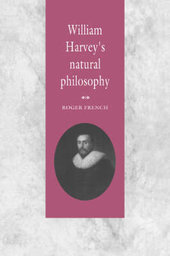
|
William Harvey's Natural Philosophy
Hardback
Main Details
| Title |
William Harvey's Natural Philosophy
|
| Authors and Contributors |
By (author) Roger French
|
| Physical Properties |
| Format:Hardback | | Pages:408 | | Dimensions(mm): Height 236,Width 157 |
|
| ISBN/Barcode |
9780521455350
|
| Classifications | Dewey:611 |
|---|
| Audience | | Professional & Vocational | |
|---|
|
Publishing Details |
| Publisher |
Cambridge University Press
|
| Imprint |
Cambridge University Press
|
| Publication Date |
26 August 1994 |
| Publication Country |
United Kingdom
|
Description
William Harvey (1578-1657) was one of the greatest figures in the history of medicine. His major contribution to the medical sciences was his discovery of the circulation of blood. He was also the personal physician to both James I and Charles I. William Harvey's natural philosophy was a view of the world that he developed during his education in Cambridge and Padua. It contained ways of structuring knowledge, formulating questions, and arriving at answers that directed the program of work in which he discovered the circulation of the blood. This book, the most extensive discussion of Harvey to be published in over 25 years, reports extensively on the views of those who argued for and against him. Professor French studies the major changes in natural philosophy in a period considered central to the history of science, and argues that natural philosophy, and particularly Harvey's specialty within it--anatomy--were theocentric. This work, which makes extensive use of primary (Latin) sources and is illustrated throughout with seventeenth-century illustrations, should be of value to historians of medicine and physicians interested in the history of their field.
Reviews"...a fascinating book." Choice "Roger French gives us a learned, intellectual history of William Harvey's discovery of the circulation of the blood and its eventual acceptance. It can be used as a handy summary of Harvey's ideas and contemporary debates about them, but it also introduces an important argument about the leading place of learned medicine in the development of experimental natural philosophy...French's book ought to be welcomed both for his sound summary of the course of the early modern arguments over the motion of the heart and the circulation of the blood, and for his arguments placing Harvey (and medicine more generally) at the heart of the scientific revolution of early modern Europe." Harold J. Cook, American Historical Review "French's careful analysis of the Demotu cordis itself, separating the discoveries of the 'forceful systole' and of the pulse from the inference to the circulation, seems especially significant for the understanding both of Harvey's discovery itself and of the many misunderstandings that followed." Isis
|